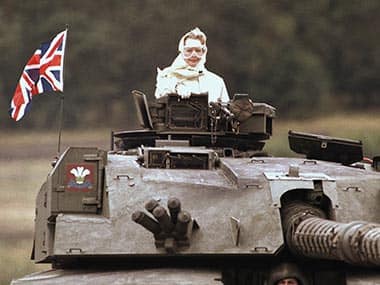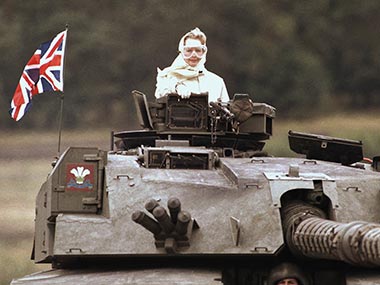by Ravin Sampat She will always divide opinion on all sides of the political spectrum, but Margaret Thatcher was the most formidable peacetime Prime Minister in the UK. Known as the Iron Lady, Thatcher governed Britain from 1979 to 1990, inspiring a generation and transforming Britain in the post-war period. There is no doubt that her legacy is much debated on all sides of British politics. When a hoax appeared on Twitter last year about her death, hundreds of tweets appeared celebrating at the thought. Some have argued that she doesn’t deserve any of praise heaped upon her, but the fact remains she inspired a generation despite many still strongly believing their lives were disrupted by her policies. [caption id=“attachment_691117” align=“alignleft” width=“380”]
 Former Britain prime minister Margaret Thatcher. AP[/caption] Today it doesn’t matter which side of the political spectrum you are on. Even Shadow Cabinet Minister Stewart Wood tweeted “She showed us that real change inspired by values was possible, & whatever our values, we should always remember that.” Her qualities as a leader were evident as soon as she took office. A huge figure on the world stage, Thatcher transformed Britain, making Britons completely change the way they looked at life, society and politics. Her leadership not only changed the way the Conservative Party approached its constituents, but also the way the Labour Party approached its constituents. They learnt a great deal from her. Many Labour politicians believe it was the way she led from the front that changed the way they looked at British politics. Tony Blair’s New Labour was largely influenced by Thatcher’s legacy, as John Kampfner notes, “It was an axiom of New Labour not to shake the foundations she had laid”. Thatcher will be remembered by those who hated her for many things but many will remember her for reversing the post war decline in the country. The current harmonious relationships that trade unions and employers have in the UK is largely due to her influence and would not have been possible without her. Privatisation, a crucial ingredient of “Thatcherism”, inspired a generation of entrepreneurs, including the thousands of Indian immigrants who had been left in the lurch by African dictators like Idi Amin a decade before, arriving onto Britain’s shores with nothing. As divisive as she was domestically, internationally, she re-established Britain’s status in the world, giving it the respect it had once held. A country in decline, she stuck to her principles during the Falklands campaign and was the first to identify Gorbhachev as the man to do business with to end the Cold War. She knew this before he came to power, convincing Ronald Reagan that this was the way to bring the Berlin Wall down. Without her influence, the Cold War would never have ended peacefully. Since she left office, Britain hasn’t had a female Prime Minister. It was hoped her reign would change that because she managed to achieve so much. She will always be remembered for her great leadership skills, fending off a male-dominated political establishment for 11 and a half years, sticking to her values right until she left office. Ravin Sampat (@_Sampat) is editor at Blottr & NewsPoint.
Former Britain prime minister Margaret Thatcher. AP[/caption] Today it doesn’t matter which side of the political spectrum you are on. Even Shadow Cabinet Minister Stewart Wood tweeted “She showed us that real change inspired by values was possible, & whatever our values, we should always remember that.” Her qualities as a leader were evident as soon as she took office. A huge figure on the world stage, Thatcher transformed Britain, making Britons completely change the way they looked at life, society and politics. Her leadership not only changed the way the Conservative Party approached its constituents, but also the way the Labour Party approached its constituents. They learnt a great deal from her. Many Labour politicians believe it was the way she led from the front that changed the way they looked at British politics. Tony Blair’s New Labour was largely influenced by Thatcher’s legacy, as John Kampfner notes, “It was an axiom of New Labour not to shake the foundations she had laid”. Thatcher will be remembered by those who hated her for many things but many will remember her for reversing the post war decline in the country. The current harmonious relationships that trade unions and employers have in the UK is largely due to her influence and would not have been possible without her. Privatisation, a crucial ingredient of “Thatcherism”, inspired a generation of entrepreneurs, including the thousands of Indian immigrants who had been left in the lurch by African dictators like Idi Amin a decade before, arriving onto Britain’s shores with nothing. As divisive as she was domestically, internationally, she re-established Britain’s status in the world, giving it the respect it had once held. A country in decline, she stuck to her principles during the Falklands campaign and was the first to identify Gorbhachev as the man to do business with to end the Cold War. She knew this before he came to power, convincing Ronald Reagan that this was the way to bring the Berlin Wall down. Without her influence, the Cold War would never have ended peacefully. Since she left office, Britain hasn’t had a female Prime Minister. It was hoped her reign would change that because she managed to achieve so much. She will always be remembered for her great leadership skills, fending off a male-dominated political establishment for 11 and a half years, sticking to her values right until she left office. Ravin Sampat (@_Sampat) is editor at Blottr & NewsPoint.
Margaret Thatcher: the 'Iron Lady' that led from the front
FP Archives
• April 8, 2013, 22:45:50 IST
Privatisation, a crucial ingredient of “Thatcherism”, inspired a generation of entrepreneurs, including the thousands of Indian immigrants left in the lurch by African dictators like Idi Amin a decade before.
Advertisement
)